Completed in 1885, Chicago’s Home Insurance Building was the world’s first skyscraper. The 138-foot-tall structure may pale in significance when compared to the world’s tallest buildings today, but it set a precedent for the future of urban development. This trend of ever-soaring skylines began in U.S. cities like Chicago and New York City and has spread to modern metropolises in the Eastern Hemisphere. Today, these are the cities with the most skyscrapers, based on the widely recognized definition as being over 150 meters (492 feet) tall.
8. Kuala Lumpur, Malaysia
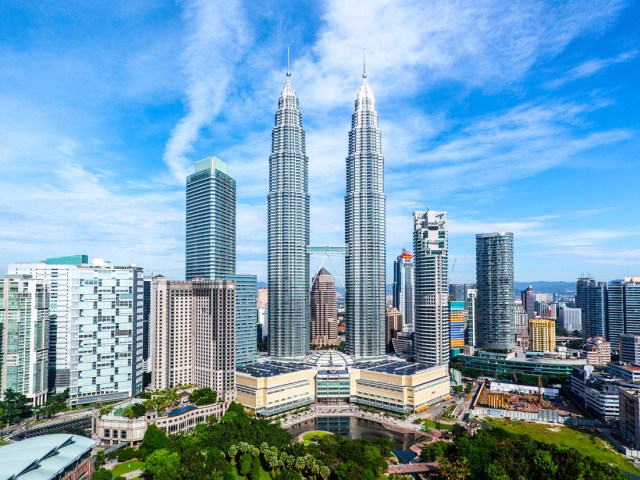
The skyline of Malaysia’s capital city exhibits a spectacular blend of modern architecture and national heritage. Kuala Lumpur has 173 buildings that meet the definition of “skyscraper” (150 meters or taller), and six that reach over 300 meters (984 feet). The architectural icons of the city are undoubtedly the 1,483-foot-tall Petronas Towers. Unveiled in 1998, these twin towers were the world’s tallest structures for 16 years. The towers display a contemporary Islamic design and are connected by a skybridge located 558 feet above ground.
Other notable buildings in Kuala Lumpur include Exchange 106 (1,300 feet tall) and KL Tower (1,380 feet), the latter of which features a popular outdoor lookout and revolving restaurant. And when completed in late 2024, Merdeka 118 will be home to the world’s highest observation deck.
7. Tokyo, Japan
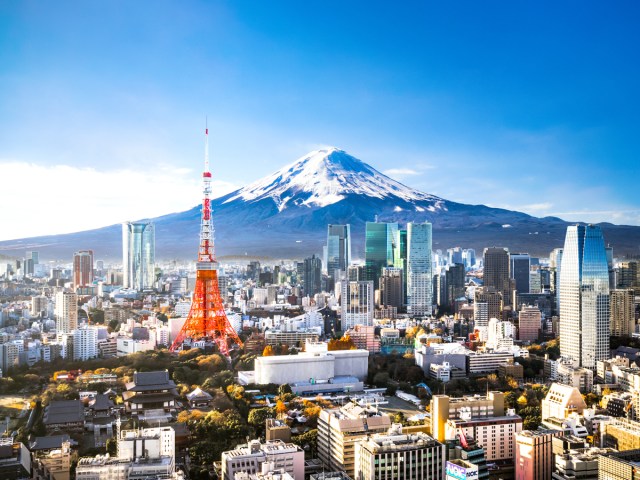
Tokyo is the world’s most populous city, so it seems fitting that it has one of the world’s tallest skylines. Characterized by modern, glass-fronted structures, the skyline of Japan’s capital contains 176 buildings over 150 meters tall. The first to exceed this height was the Kasumigaseki Building, erected in 1968.
Today, the 2,080-foot Tokyo Skytree is both Japan’s tallest and the world’s third-tallest freestanding structure. It functions as a broadcasting tower and a popular tourist attraction, with its wraparound observation deck offering views of the city and Mount Fuji. The city’s next-tallest building, the mixed-use Tokyo Torch, is almost half the height of the Tokyo Skytree, at 1,280 feet.
6. Guangzhou, China
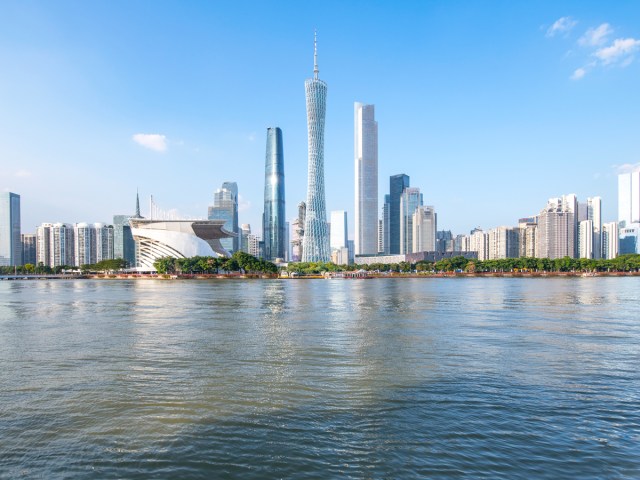
Located on the banks of the Pearl River, Guangzhou is a bustling port city home to numerous multinational corporations and trading industries. The city’s shimmering skyline consists of 193 skyscrapers. Eleven of these, including Guangzhou CTF Finance Centre and Guangzhou International Finance Centre, rise well over 1,000 feet. However, the city’s tallest structure is the 1,982-foot-tall Canton Tower. The design is inspired by the silhouette of a female hip, and it has observation decks on three levels and a unique rollercoaster-like attraction that circles the tower’s upper section, called the Bubble Tram.
5. Shanghai, China
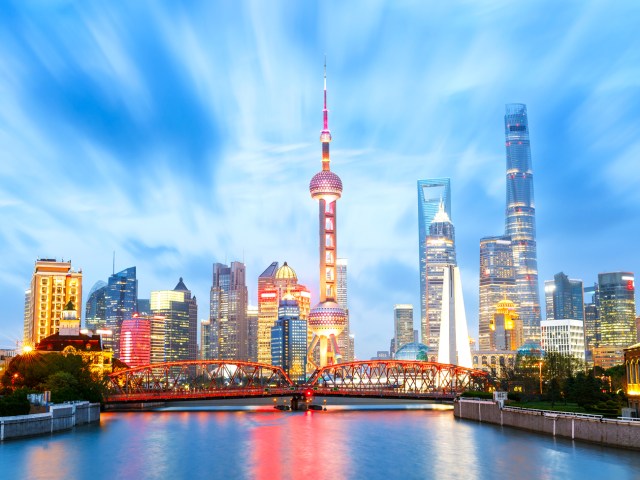
As China’s biggest city grew into a formidable hub for international commerce, Shanghai’s skyline has changed dramatically since the 46-floor Jin Jang Hotel was built in 1988. Currently, the city has 194 skyscrapers, making it China’s third-tallest city.
The loftiest of them all — and the tallest building in China — is the Shanghai Tower. It rises 2,073 feet above the Huangpu River in a futuristic helical shape. This mixed-use business, residential, and recreational building is home to the Top of Shanghai observation deck. It stands adjacent to Shanghai World Financial Center, China’s second-tallest building.
4. Dubai, United Arab Emirates
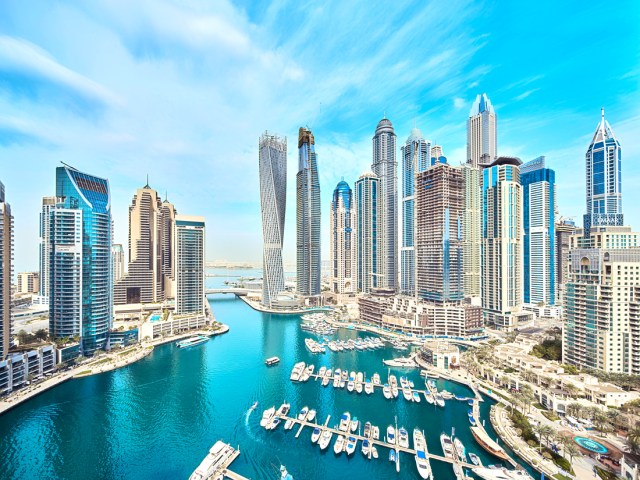
Dubai was once a low-lying fishing village known for sand and souks. But that began to change quickly after the discovery of oil here in 1966, when Sheik Rashid bin Saeed Al Maktoum set about turning the city into a modern port and commercial center. What followed was one of the world’s fastest and most dramatic skyline evolutions in history.
The Jumeirah Burj Al Arab hotel, with its iconic sail shape, was Dubai’s first building over 150 meters (492 feet). There are now 263 such buildings — with more opulent towers likely to come. Dubai also boasts the most skyscrapers over 300 meters (984 feet), with 31 of them. The city’s tallest structure — and the tallest building in the world — is the 2,716-foot-tall Burj Khalifa.
3. New York, New York
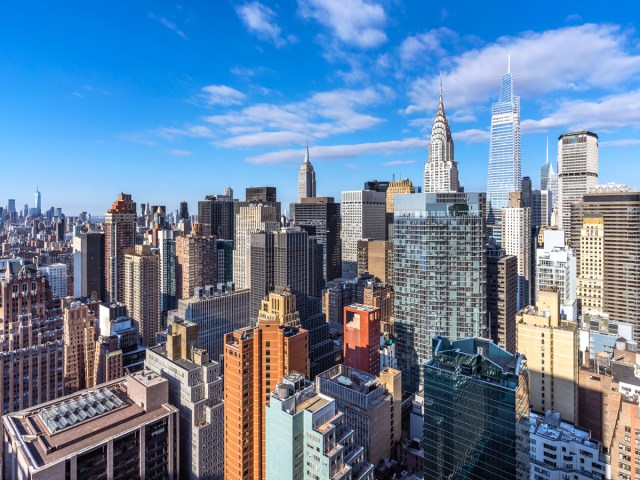
Omnipresent on postcards and on the big screen, New York City has arguably the most recognizable skyline on the planet. It began taking shape back in 1908 with the construction of the Singer Building, the world’s first building over 150 meters in height. From then, until 1973, seven consecutive New York City structures held the title of the world’s tallest building.
Among them are art deco landmarks such as the Chrysler Building and Empire State Building. In total, the Big Apple has 318 buildings over 150 meters (492 feet) and 17 over 300 meters (984 feet) tall. The tallest today is One World Trade Center, a 1,776-foot office building with 104 floors accessed via 54 high-speed elevators.
2. Shenzhen, China
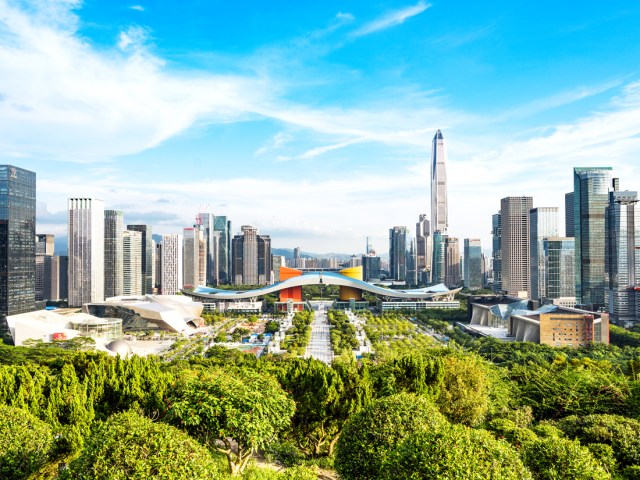
Shenzhen is a sprawling industrial and financial megacity bordering Hong Kong in southeastern China. It has 413 skyscrapers, including 163 that exceed 200 meters (656 feet) and 21 that are at least 300 meters (984 feet) tall. Soaring 1,844 feet above the city’s Futian District, the vertigo-inducing Ping An Financial Center is Shenzhen’s tallest building, home to a hotel, retail spaces, and offices. Life wasn’t always this way in Shenzhen, however. As recently as 1978, it was a city of only 330,000 residents, but today it is a booming metropolis of over 12 million.
1. Hong Kong, China
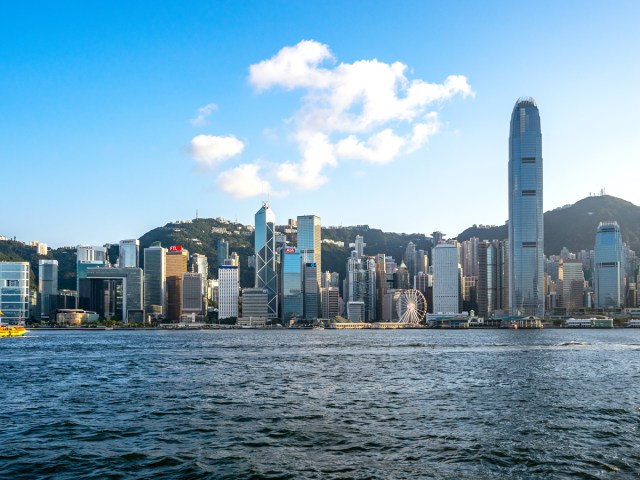
Split between mainland China and the mountainous Hong Kong Island, Hong Kong is the city with the most skyscrapers in the world. The skyline of this densely populated financial hub is decorated with 558 skyscrapers — more than double the amount in Dubai. This high-rise development was a result of the city’s robust economic growth in the 1970s.
Hong Kong’s two tallest skyscrapers — International Commerce Centre (1,588 feet) and Two International Finance Centre (1,352 feet) — face each other on opposite sides of Victoria Harbour. The former is the setting for the twice-daily ICC Light and Music Show, a popular tourist attraction.
More from our network
Daily Passport is part of Inbox Studio, an email-first media company. *Indicates a third-party property.
















